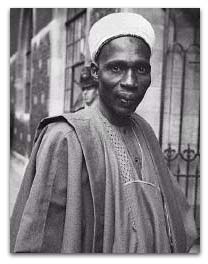WE hardly
expected so rapid a confirmation of the views we ventured to put forward on
January 23rd. Every one, however, will read the thrilling account of the battle
of Bida, and no one who reads it will, we think, doubt that Negroes can fight,
or that we are undertaking in the territory which we begin to call
"Nigeria," as if the right to revolutionise the maps were already
ours, a work of the greatest difficulty and importance. We have won, through
the cool heroism and judgment which Englishmen, when once released from their
dependence on the House of Commons, always exhibit, but the victory was clearly
a touch-and-go affair from first to last. The troops of the Niger Company, some
five hundred drilled Negroes of the Hausa tribe, with twenty-three white men
among them, accompanied by Sir George Tubman Goldie, formerly an officer in the
Engineers, now Governor of the Company, and quite as remarkable a person as Mr.
Rhodes, advanced. On January 25th to the occupation of Bida. This place is the
stronghold and capital of the Fulani, the dominant Negro race of the Niger, and
is at least four hundred miles distant from the coast. The Fulani were from
twenty thousand to thirty thousand strong, they had clouds of cavalry, and they
occupied a strong position on the ridge between the invaders and the town.
Having, moreover, some military skill, they had sent out heavy flanking parties
to attack the British guns, which, being , hampered by the swamps, were still
in the rear of the advancing force. Major Arnold, the officer in direct command
of the advance, decided to attack the ridge, cleared , it of the enemy, and
then, finding himself enveloped by the ' flanking parties, retired, formed
square, and successfully defied the charges which the enemy, though mowed down
by the Maxims, repeatedly made, apparently with all the daring of Zulus or
Matabeles. The fighting lasted for four hours, from 9 a.m. to 1 p.m. ; but by
that time the heavy guns, With their ammunition-waggons, had fought their way
up, and the enemy, unable to bear the fresh slaughter among their masses from
great guns at point-blank range, retreated in confusion, so that the town was
stormed with little loss on January 29th. That was a really grand feat of arms,
a victory at odds of one to forty, accomplished with the loss of only one
European, Lieutenant Thomson ; but notice in the account how easily the fate of
the day might have gone the other way. Major Arnold, it is clear, was entirely
surrounded, for even the guns in his rear were attacked, his square contained
only five hundred men, and but for the arrival of the guns, which might have
been delayed for hours by swamp or• other difficulties of their route, the
square might have been broken and erased. The attacking force, in fact, was
wholly inadequate if the enemy would fight; and it has yet to do, as we fear
without reinforcements, still more serious work. The Fulani power must be
broken everywhere, not only in norm, which is the next province to be cleared
of them, but in the kingdoms to which Nup4 and fork are nominally or really feudatories;
and with every victory as we press onward the numbers will be greater, the
fighting more desperate, and the difficulty of conveying heavy artillery and
the waggons, which are as necessary as the guns, less easy to overcome. And, as
we maintain, the negro, when their savagery is for moment suspended, by any
cause, be it religion, or devotion to a chief, or despair, is a formidable
fighting animal. Look at these Hausas who have taken Bids. Could British soldiers
have fought better? If Sir George Goldie had those thirty thousand Fulani under
his command for six months he could conquer Western Africa, and the qualities
which discipline imparts permanently to the Hausas may be imparted for one day
to other tribes by fanaticism, the tyranny of a leader, or despair. One day of
thorough defeat would clear us out of West Africa.
We trust we shall not be mistaken. We do not object to this war at
all. If we are to civilise Africa that great work must be commenced by
impressing upon all Negroes that in the last resort we have power to enforce
our orders by inflicting the penalty of death. We must conquer, in fact, before
we can legislate. Our protest is confined to the method we are adopting, which
seems to us on, two points dangerous and bad. In our economy or in our pride—we
really do not know which is the stronger motive-power—we try to work with
forces too small for the task to be performed, and call upon our agents not
only for acts of splendid audacity, which is a reasonable call with Englishmen
and very seldom unsuccessful, but for a continuity of good fortune which our
soldiers cannot control, and without which their devotion would be of no
effect. That is not a reasonable call, and some day will involve us in a
horrible disaster, as it did in the contest with Cetewayo. An island on the
West Coast, where we are in reality so weak, would be an awful affair, and it
is that, and nothing less, which we are risking, just because we cannot bring
ourselves to believe that when the combatants are black men and white men
disparity of force makes any difference. Nine times out of ten it makes none,
but the tenth time may be the all-important one, and then through the merest
accident, a blunder by the commandant or the non-arrival of some ammunition,
our minute force may be overwhelmed by the rush of mere numbers. Suppose the Fulani,
who died so freely, had gone on bearing their losses and rushing forward for
another twenty minutes! It is Imperial work that we are setting ourselves to
do, and we run risks that would be hardly wise if a forlorn hope were attacking
the gate of some bandits' peel on a wild border.
The other point is a moral one, and we do not know that we can convince our
readers of either its validity or its importance. We do not believe it is right
to conquer these vast regions and then leave their millions of inhabitants to
be governed by companies whose first idea, if their directors are honest
business men, is and must be dividend. We see the horrible results of that
system on the Congo, and though Englishmen are not Belgians, we have, as
regards the question of black labour, very little confidence in the
profit-seeking section 'even of our own countrymen. We see what they think just
in Rhodesia; and what they think just, unless their own officials malign them,
is slavery with wages, without sales by auction, and without the obligation to
feed the old. Black men are working in the mines there in thousands without
their own consent. The justification, the only justification, for our incessant
conquests in Africa is that we give the people, who for three thousand years have
never advanced beyond the savage stage, a chance of rising into the next or
semi-civilised stage—an unspeakable improvement— and they can make no such
advance if they are held to labour against their own will for the personal
benefit of traders who' to begin with, dislike and impede the competition of
all rivals. Mr. Cecil Rhodes will doubtless describe that doctrine as
"unctuous rectitude," and ask what difference we see between the
conscription of law and the still stronger conscription of hunger; but we
answer clearly that the one is consistent with freedom and the other is not,
and that if history proves anything it proves that, freedom to work or starve,
according to choice, Is the first condition of advancing civilisation. We are
not, be it understood, bringing any accusation against the Niger Company. We
have no evidence that it enforces labour, and think it very probable that it
looks for profit to a monopoly of oil much more than to any kind of undertaking
in which a cornee would be profitable. But we ca1 see clearly that it is going
to acquire very large territories, that it will shortly have subjects by the
million, and. that it will be subjected to the usual temptation,—vis., to
govern them in its own pecuniary interest, and not either in theirs or in that
of the country at large. The only working preventive of that state of affairs
is the Royal authority, and we again ask the Ministry and the House Of Commons
whether it is not time to make that authority felt, either by the direct
government of our new possessions, or, if that is too sudden a change, by
investing the Colonial Office with the powers and duties and responsibilities
of the old Board of Control for East India affairs. That Board performed its
duties excellently well, and the traditional method of working it has not yet
had time to die completely away. We detest can’t quite as much as Mr. Rhodes
can do, but for God's sake do not let us mow down black men in swathes and
waste the heroic courage of our own people in order to get more oil.








